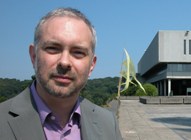UNESCO Chair

Professor Colin McInnes
29 November 2007
UNESCO awards Chair in HIV/AIDS, Education and Security to Aberystwyth University
Professor Colin McInnes, Head of the Department of International Politics at Aberystwyth University, has been awarded a UNESCO Professorial Chair in HIV/AIDS, Education and Security.
The Chair was formally announced at a UNESCO HIV/AIDS awareness event at the Senedd building in Cardiff Bay on Thursday 29 November 2007. It is the first UNESCO Chair in Wales and only the eighth in the UK.
Professor McInnes has welcomed the development:
“It is a great honour to be awarded the first UNESCO Chair in Wales. The Chair is an endorsement of the pioneering work undertaken in the Department of International Politics at Aberystwyth University on the international politics of disease, especially HIVAIDS. It is also a challenge to better understand the social consequences of HIV/AIDS and how we should respond.”
The UNESCO Wales Committee invited Welsh Universities to put forward proposals for Professorial Chairs that would meet the Committee's priorities and UNESCO criteria. The Wales Committee was thoroughly impressed with the achievements and excellence of the Aberystwyth work on HIV/AIDS & security and gave its unanimous support to the proposal. The proposal was submitted to UNESCO headquarters in Paris and the Director-General of UNESCO, Koichura Matsuura, announced that a UNESCO Chair would be coming to Wales when he spoke at the UNESCO UK conference in Cardiff in July.
Professor Michael Scott, Chair of the UNESCO Wales Committee, said:
“It has been just two years since the UNESCO Wales Committee was established, but already it is forging a distinct identity and making a significant contribution to furthering UNESCO's work in the UK.
“The award of the UNESCO Chair in HIV/AIDS, Education and Security is a huge boost to Wales’s international profile and recognition of the leading role that Professor McInnes is playing in positioning HIV/AIDS as an issue that should be addressed as part of the global security agenda.
“It also complements two current UNESCO Wales projects underway to increase training provision for healthcare professionals in Tanzania and tackling HIV/AIDS related risk behaviours in Lesotho,” he added.
Professor McInnes is Director of CHAIR, the Centre for Health and International Relations, which is based at the Department of International Politics. His perspective is that HIV/AIDS should not be looked at simply as a medical issue, but in terms of the security implications and the social impact it has on individuals, families, communities and the wider state.
Prompted by the awarding of the UNESCO Professorial Chair in HIV/AIDS, Education and Security, the Centre for Health and International Relations is setting up a network of scholarly exchange and research with South African universities on the human and security dimensions of the pandemic.
UNESCO
The UNESCO Cymru Wales Committee was established in 2005 to support the work of the UK National Commission for UNESCO and bring a Welsh perspective and input to UNESCO’s work programmes.
Further information about UNESCO can be viewed at http://www.unesco.org.uk/UNESCO1.htm, and UNESCO Professorial Chairs at http://www.unesco.org.uk/UNESCO_Chairs1.htm
Professor Colin McInnes
Colin McInnes is Professor of International Politics and Director of CHAIR, the Centre for Health and International Relations. He joined the Department of International Politics in 1986. He began with an interest in security studies and his interests now are in the manner in which health and security interact, particularly with regard to HIV/AIDS. He was Academic Consultant for the Nuffield Trust Global Programme on Health, Foreign Policy and Security and has held major grants on health-related issues from The Nuffield Trust, the ESRC and HEFCW. He has lectured widely on health and security issues, both in the UK and abroad, as well as briefing governments, politicians and officials internationally.
His current research interests are HIV/AIDS, security and human security; Security and infectious diseases; Tobacco; Health and foreign policy.
The Centre for Health and International Relations (CHAIR)
CHAIR was established within the Department of International Politics in 2003, having attracted substantial funding to undertake a far-reaching programme of research on the relationships between health and international politics. The Centre has also attracted research grants from the Nuffield Trust and the ESRC New Security Challenges Programme for work on the linkages between health, security and foreign policy. The Centre works from the assumption that there are compelling reasons for linking health and International Relations, and views the politics of global health in terms of the wider agenda of International Relations for the first time. Other work at the Centre encompasses the implications of neo-liberalism for public health and health equity, ongoing research on UK overseas health investments, and a study of health as an emerging issue in foreign policy. For more information on CHAIR contact: Owain Williams (odw@aber.ac.uk, or 00441970 621799)
The Department of International Politics
Founded in 1919, the Department was the world's first university department of international relations. Since then it has developed as a centre of international excellence in both research and teaching.
The excellence of the Department's research was recognised in the most recent (2001) National Research Selectivity Exercise, when it was rated 5*, which makes it one of the leading departments in Britain in the area of international relations. Similarly, the quality of teaching was assessed in the most recent exercise by the Higher Education Funding Council and judged to be excellent – the first department of politics or international relations in the UK to be awarded the highest possible grade.
The Department currently has students from 41 different countries. With over 30 members of academic staff, over 500 undergraduate students and a graduate school of 120, it is amongst the largest international relations departments in the world.



